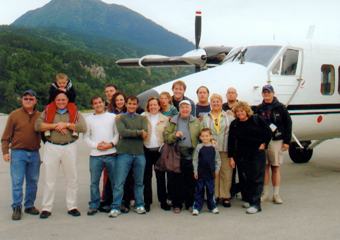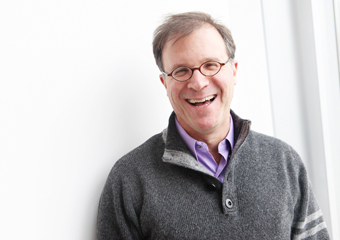Cancer Fighters
Permanent link

The whole family on our cancer-free cruise to Alaska
In May of 2006, I graduated from college and prepared to enter The Real World. I’d been readying myself mentally for months like most of my peers. After a quick trip to Israel, I came home and started my first job at a big PR firm in June. By August, I was living in a one-bedroom apartment in Lakeview. I was self sufficient, spending weekends with friends, exploring over 21 life in the city, and in the throes of a wonderful, exciting new relationship. I was following “my plan.” I thought I was all set, and that I was a real adult.
And then my perfect vision of independent adult life came crashing down. Following my 23rd birthday in October, my mom was diagnosed with stage III breast cancer. The doctors told us it had already spread to several of her lymph nodes and that she would need immediate surgery, followed by courses of chemotherapy and radiation treatments.
My family is very close. My mom is the center of this universe. My universe. I’m her only child (my sisters are from my dad’s first marriage) and we’ve always been extremely close. How could this happen to the most important person in my life?
I can’t begin to express what it feels like to learn that your mother’s health, well being and general existence in your life is really, seriously, suddenly threatened. To say that I (and the rest of my family) took my mom’s ability to be that center for granted would be a huge understatement.
My mom is the type of mother who when I called to complain about a particularly stressful week in school would fly out from Chicago to upstate New York for the weekend accompanied by my dog, a few books and her Sudoku puzzles to sit in the school library and keep me company while I studied for many straight hours.
The sudden fear of losing her took over my life and the lives of my sisters, my dad, my aunts, my cousins, so many people who always turned to her first in any crisis.
The first few weeks following the diagnosis are still a blur. It was hard for any of us to think. My mom told us from the start that she didn’t want to listen to all of the dire medical pronouncements (I learned quickly that doctors refuse to be even slightly optimistic).
She needed us to go to be her ears, to meet and to interview several oncologists and surgeons before we, as a family, choose a course of action. This was the first time that my mom had really asked us for help. We all immediately reacted. My sister cancelled her family vacation. My aunt flew in for an indefinite stay from San Diego. I got time off from the new job that had seemed so important a few short months before. For the first time ever, we rallied around my mom.
We turned into a mini army. We marched into each doctor’s office with our different assignments. My lawyer sister asked the tough questions, “Why won’t you do annual cat scans to check for new tumors?” My aunt taped and transcribed every meeting. Needless to say, we weren’t always popular with the doctors. More than one doctor told us that he had never before seen such a large group continuously show up at appointment after appointment to support my mom and berate him with questions.
There were a lot of tears shed for a lot of months by people who I don’t usually see cry. There were a few laughs too and many I love yous. We learned quickly (and this is the best advice I can offer anyone else facing cancer) that the one thing you can’t ever do is look back. That was the one rule that kept us all sane for months. Once a course of treatment had been decided and started, we didn’t ever question that decision.
In the end, collectively, we got through it. After my mom’s final radiation treatment, 17 members of my family boarded a celebratory cancer-free cruise to Alaska. It was the beginning of a party that included a trip to Hawaii and culminated in my mom’s 60th birthday bash.

Enjoying family dinner aboard the cruise
For a long time, it didn’t seem like things could ever calm down, but they did. And while we all live with the fear of the cancer coming back, we are returning to normalcy. And we’ve learned as a family that we can cope with anything.
My mom once again is leading the pack. She and her nutritionist have successfully convinced my family to adopt a much healthier lifestyle. We all, to varying degrees, eat organic. My mom has lost a great deal of weight. She sports a cute, short, all white, hair-do. And she looks great--the best that I can remember.
I also have a new outlook on my so-called adult life. I’ve learned to be slightly more independent and I try not to turn to my parents for everything. It took me 25 years to realize that my parents aren’t invincible. Parents age, they get older and they turn to you for support and strength. I still struggle with this whole growing up thing. I can’t pay my own taxes or make most big decisions without consulting my mom first, but I found out that I can really be there for her now too.
I realize that being an adult is a lot more than excelling in school, getting a job, an independent income and an apartment. It’s about facing tough realities and coping with the unexpected wrench in the plans. I’ve been through bad and I can handle almost anything.
Last week, during one of the more treacherous snow storms, my mom woke me up at 6:00 in the morning from her vacation in South Florida to tell me to be extra careful on the roads. This type of overprotective, Jewish mother call before the cancer would have annoyed me to no end, but now it’s one that makes me very happy…and grateful.




.jpg)



